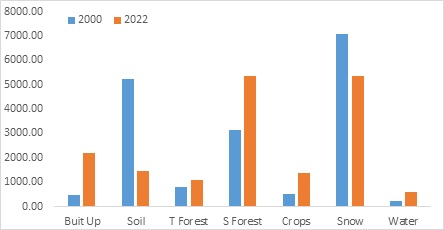Drivers and Implications of LULC Dynamics in Hazara and Its Impacts on Cereal Crops
Keywords:
Drivers, Finchaa, Land use/land cover, Sustainable, Watershed ManagementAbstract
In order to generate and give useful information to policymakers and development practitioners regarding the scale and trends of land use/land cover change (LULCC), it is necessary to have a firm grasp on its trajectories and extents. This research details the causes, effects, and implications of LULCC in the Finchaa catchment on long-term sustainable land management. The land use maps and change quantifications were created using data from Landsat photos taken in 1987, 2002, and 2017. The photos were classified using a supervised classification method and a maximum likelihood classifier. The socioeconomic survey combined key informant interviews, focus groups, and transect walks. Over the previous three decades, forestland, rangeland, grazing land, and swampy regions have shrunk while agricultural land, commercial farm, built-up, and water bodies have expanded. Lack of good catchment management practices in the name of "intensive agriculture" has long been a source of trouble for the region. Increasing erosion and sedimentation of surrounding water bodies is a consequence of increased farming on steep hillsides. The observed LULCC in the research area was the result of a combination of biophysical, socioeconomic, institutional, technological, and demographic variables. The main effects of LULCC in the Finchaa catchment are a decrease in agricultural yield, loss of biodiversity, prolonged aridity and drought, land and soil degradation, and a decrease in water resources. The long-standing gap between catchment area supply and demand for both land and water has been exacerbated by socioeconomic changes and population growth. Risk management will require watershed management policies that are more holistic and interconnected


















